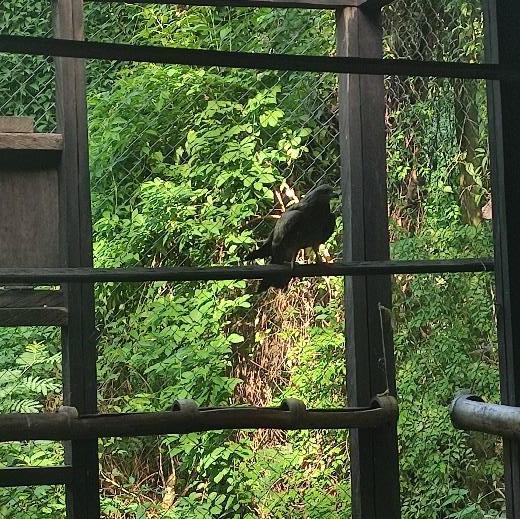
3 minute read
FOREWORD
EXECUTIVE SUMMARY | PROJECT MANAGER
Chimp, Shark, and Sun
Advertisement
Dear Friends and Supporters,
Over the past years, our team has made outstanding progress in socializing and resocializing individuals and integrating them into groups, where they belong. This is the basic social structure for all our primate species, and the foundation of our work is to guarantee their standard of welfare. If one species is known for presenting more challenges than others, it would be the chimpanzee. The socialization and rehabilitation process is especially complex when it concerns adults.
This month, our team accomplished a milestone by completing 4 individual integrations: 3 into two groups of chimps (Nanga, Papa and Koto) and 1 in the group of Olive baboons. Two individuals, Mboppi (an adult female Olive baboon) and Koto (an adult male chimpanzee) returned into their groups after months of intensive medical care. Because the hierarchy in their groups had changed in their absence, their return required careful thought.
Thanks to the huge experience of our team, the protocol was implemented carefully, with continuous monitoring allowing our team to take action if required. As the days passed, adjustments were made, until both Mboppi and Koto re-established relationships with each of the group members. We will keep monitoring for several weeks until we consider the group to be stable again. Until such stability is scientifically demonstrated, we will remain extremely vigilant. Overconfidence can mean missing details which could have dramatic consequences days after. Teamwork, sharp eyes and experience make the cocktail of skills required to make integration successful.
The transfer of Nanga and Papa, two adult male chimpanzees, from the Island group to the Mainland group was another highly technical and stressful operation we are proud to report this month. After 3 months of familiarisation without direct contact and 2 months of step-by-step integration, both males have found their place in the group. Nanga, a younger yet more fearless and less diplomatic individual, has had to go through physical challenges with the other males and females. No major injuries occurred, but we will need extra cautionto prevent any risk. Papa, conversely, used good politics to find his place peacefully, probably thinking ahead to climbing the hierarchical ladder over time. There are some key principles to consider when conducting such a difficult process. 1) The receiving group should be cohesive and stable; the hierarchy and each personality must be known; 2) the personality of the new individuals and their relationships must be well-known; 3) constant monitoring observation before, during and after the integration must be done following scientific protocol; 4) teamwork, consultation, and discussion are instrumental; 5) take time but do not slow the process unnecessarily: extra caution can increase the risk of failure, and 6) a well-evaluated risk must then be taken: no one can ever be 100% sure of how chimps will behave. Our role as caretakers is then to provide a safe environment, sufficient amount and quality of food, enrichments and presence without interference to facilitate the process. What happens in absence of caretakers also needs to be foreseen, as individuals behave differently in the presence of humans. Then, what happens there stays there!
This month was sunny and we are proud and happy with our achievements. The multiple difficulties faced this month, the increasing threat of the second wave of COVID-19, and the consistent frustration of conservation resistance in the country cannot change that!
As usual, we made good progress on several projects. Art4Nature, in partnership with artist Toh Bright and the UNESCO, is ongoing well, as is the maintenance of the gorilla night dens. An
extra piece of good news is available on page 11,highlighting the success of Forbah Sandra Ngwemetoh, an ex-LWC volunteer, as a conservation leader. She sets an example to other Cameroonians as a pioneer in protecting the planet by local action. It is needed more than ever. Tragically, this month also saw a young 8-meter long rare and endangered (and therefore by law entirely protected species) whale shark butchered by a crowd of people, in front of law enforcement representatives. Another dramatic scene that has repeated itself in the sad theatre of life.
Thanks,Sandra for giving us hope.
Thank you all, as ever, for your unfailing support.
Peggy Motsch Project manager









